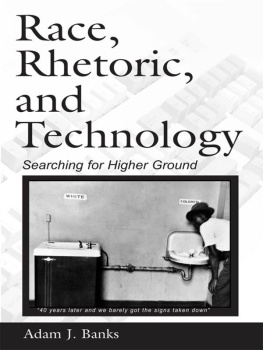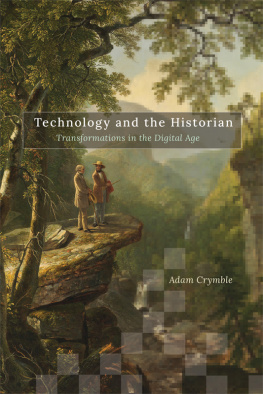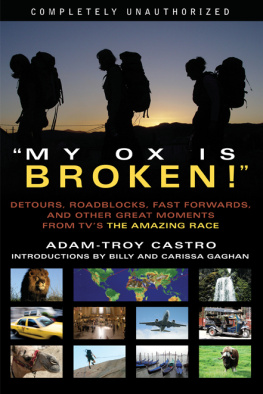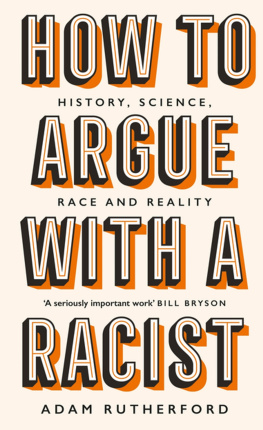Adam J. Banks - Race, Rhetoric, and Technology
Here you can read online Adam J. Banks - Race, Rhetoric, and Technology full text of the book (entire story) in english for free. Download pdf and epub, get meaning, cover and reviews about this ebook. year: 2006, publisher: Routledge, genre: Politics. Description of the work, (preface) as well as reviews are available. Best literature library LitArk.com created for fans of good reading and offers a wide selection of genres:
Romance novel
Science fiction
Adventure
Detective
Science
History
Home and family
Prose
Art
Politics
Computer
Non-fiction
Religion
Business
Children
Humor
Choose a favorite category and find really read worthwhile books. Enjoy immersion in the world of imagination, feel the emotions of the characters or learn something new for yourself, make an fascinating discovery.
- Book:Race, Rhetoric, and Technology
- Author:
- Publisher:Routledge
- Genre:
- Year:2006
- Rating:3 / 5
- Favourites:Add to favourites
- Your mark:
- 60
- 1
- 2
- 3
- 4
- 5
Race, Rhetoric, and Technology: summary, description and annotation
We offer to read an annotation, description, summary or preface (depends on what the author of the book "Race, Rhetoric, and Technology" wrote himself). If you haven't found the necessary information about the book — write in the comments, we will try to find it.
Race, Rhetoric, and Technology — read online for free the complete book (whole text) full work
Below is the text of the book, divided by pages. System saving the place of the last page read, allows you to conveniently read the book "Race, Rhetoric, and Technology" online for free, without having to search again every time where you left off. Put a bookmark, and you can go to the page where you finished reading at any time.
Font size:
Interval:
Bookmark:

Andrea A. Lunsford and Beverly J. Moss, Series Editors

Alsup Teacher Identity Discourses: Negotiating Personal and Professional Spaces
Banks Race, Rhetoric, and Technology: Searching for Higher Ground
The NCTE-LEA Research Series in Literacy and Composition publishes groundbreaking work on literacy, on composition, and on the intersections between the two.
Volumes in this series are primarily original authored or coauthored works that are theoretically significant and hold broad relevance to literacy studies, composition, and rhetoric. The series also includes occasional landmark compendiums of research. The scope of the series includes qualitative and quantitative methodologies; a range of perspectives and approaches (e.g., sociocultural, cognitive, feminist, psycholinguistic, pedagogical, critical, historical); and research on diverse populations, contexts (e.g., classrooms, school systems, families, communities) and forms of literacy (e.g., print, electronic, popular media). The intended audience is scholars, professionals, and students in a range of fields in English studies, including literacy education, language arts, composition, and rhetoric.
For additional information about the NCTE-LEA Research Series in Literacy and Composition and guidelines for submitting proposals visit www.erlbaum.com or www.ncte.org.


Syracuse University

Lawrence Erlbaum Associates, Inc.
10 Industrial Avenue, Mahwah, New Jersey 07430

National Council of Teachers of English
1111 W. Kenyon Road, Urbana, Illinois 61801-1096
This edition published in the Taylor & Francis e-Library, 2008.
To purchase your own copy of this or any of Taylor & Francis or Routledges collection of thousands of eBooks please go to www.eBookstore.tandf.co.uk.
A co-publication of LEA and NCTE.
Copyright 2006 by Lawrence Erlbaum Associates, Inc.
All rights reserved. No part of this book may be reproduced in any form, by photostat, microform, retrieval system, or any other means, without prior written permission of the publisher.
| Lawrence Erlbaum Associates, Inc., Publishers | National Council of Teachers of English |
| 10 Industrial Avenue | 1111 West Kenyon Road |
| Mahwah, New Jersey 07430 | Urbana, IL 61801-1096 |
| www.erlbaum.com | www.ncte.org |
Cover photo: Segregated water fountains, North Carolina, 1950.
Copyright Elliott Erwitt/Magnum Photos.
Library of Congress Cataloging-in-Publication Data
Banks, Adam J. (Adam Joel)
Race, rhetoric, and technology : searching for higher ground / Adam J.
Banks.
p. cm.
(NCTE-LEA research series in literacy and composition)
Includes bibliographical references and index.
ISBN 0-8058-5312-X (cloth : alk. paper)
ISBN 0-8058-5313-8 (pbk. : alk. paper)
1. African AmericansSocial conditions1975 2. African AmericansIntellectual life. 3. African AmericansCommunication. 4. Digital divideUnited States. 5. TechnologySocial aspectsUnited States. 6. RhetoricSocial aspectsUnited States. 7. United StatesRace relations. 8. RacismUnited States. I. Title. II. Series.
E185.86.B264 2005
305.896073dc22
2005040144
CIP
ISBN 1-4106-1738-6 Master e-book ISBN
To Stevie, for continuing to call us to find higher ground.
To all those old souls who made SOUL a style, a mode of resistance and participation, a vision of the best we can be.
To my parents for making me a midnight believer.
To KG for giving me an academy worth believing in.
Out. That place of performance excellence beyond the ordinary, as in she or he just took it out. Not to a totally strange place, but one familiar enough that we could have imagined it or even arrived at it ourselves had we been so astute, symbolic action close enough to what we already know that we can readily recognize the genius involved. This is my initial response to reading Race, Rhetoric, and Technology: Searching for Higher Ground. With this debut book, Adam Banks has taken it, yes, higher, but also out, has taken the study of African American Rhetoric, perhaps even the field of Rhetoric and Composition more broadly, fully into the twenty-first century, for this is the most sweeping, intelligent, and provocative articulation we have of racialized rhetoric and social justice, and their connections to issues of technology and design.
As I draft this present text, I am also watching FDR: A Presidency Revealed and learning how Roosevelt worked painstakinglyand quite painfullyto construct a visual rhetoric that projected him to the general public as an able-bodied man, a design strategy, a technology given the mechanical devices needed to complete the illusion, that enabled him to become the most important politician of the twentieth century. Whatever memorable words President Roosevelt spoke were made possible by his successful ruse. As I refocus on Banks manuscript, I am reminded (televisions direct influence on my education) of how cogent his move is to treat Martin Luther King, Jr. and Malcolm X, the two most-studied African American rhetors of the twentieth century, in a similar fashion. He clearly links their awareness of technological possibilities to the brilliance of their rhetorical strategies. Overall, with his emphasis on things technological, Banks challenges the dominant, logocentric or great-speaker constructions of the African American rhetorical tradition, but he has done so in a way that demonstrates clear respect for the word-based scholarly predecessors (myself included) who are objects of his critique. He does not argue that his elders got it wrong, simply that by ignoring technology they have missed an opportunity to present a fuller picture. This line of reasoning is certainly fair. But there is much more at stake with Banks project than a precocious intellect trying to get props. He argues forcefully that to the extent that technology structures opportunity in the United States, racism and racialized exclusions are technological issues. It follows, for him, that if our nation ultimately fails to eliminate racist exploitation from its grand technological experiment, then it cannot fulfill its democratic promise. A primary aim of his analysis, therefore, is to set an agenda for discussion and action.
Drawing upon his own educational journey, Banks highlights his understanding of the Digital Divide, which he views as an information-age manifestation of the Racial Ravine. Perhaps its a good thing our author didnt get that Atari 2600 he coveted as a child; he would have lost his critical edge. Fortunately, we have him around to suggest the development of a Black digital ethos, a multi-faceted mindset with which to assess appropriately the discourse on technology, the efforts at technology activism, and a variety of educational proposals. In short, computers alone are never a panacea. We have to contextualize the use of computers to make helpful judgments about their efficacy in terms of the educational development of African Americans. The game continually changes. Keep this NiggerBoy Running read the haunting note in Ellisons
Font size:
Interval:
Bookmark:
Similar books «Race, Rhetoric, and Technology»
Look at similar books to Race, Rhetoric, and Technology. We have selected literature similar in name and meaning in the hope of providing readers with more options to find new, interesting, not yet read works.
Discussion, reviews of the book Race, Rhetoric, and Technology and just readers' own opinions. Leave your comments, write what you think about the work, its meaning or the main characters. Specify what exactly you liked and what you didn't like, and why you think so.









